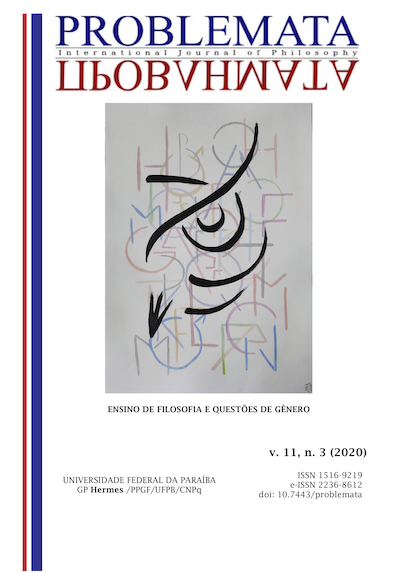DISCUSSIONS ON GENDER IDENTITY AND TENSIONS IN THE SCHOOL ENVIRONMENT
DOI:
https://doi.org/10.7443/problemata.v11i3.53752Keywords:
Identity concepts, Gender, Education, Public policyAbstract
This article discusses different conceptions of identity formation theories, discussing their implications for public policy proposals for education. In this sense, presenting the question in a panoramic way is fundamental, as it demonstrates that there is not only an approach to the question. The discussion starts from a philosophical perspective, but includes other equally important contributions, such as from the areas of neurology, psychology, theology, biology and anthropology. The theme of identity is not restricted to a human perspective only, so the discussions pervade the multiple views that make the theme of identity a question of the now. The first part addresses the issue of maintaining the freedom to differ, by legitimizing the disagreement in the face of the problems faced by educators. The second part presents five conceptions about the formation of identity: the perspective of social construction; gender performance; gender uniessentialism; biological determinism; and, Christian perspective on identity. Finally, the problem of choosing the identity perspective show in the references for education and its possible political and social consequences. The problem of the unilateral option made by the Brazilian State generates internal and external conflicts in the school environment. Thus, the final reflection, under the theory of John Rawls, seeks to open the perspective on how a just society can observe the principles that guarantee individual freedom, justice and equal conditions for all.
Downloads
References
ARAÚJO, Luís Bernardo. Jonh Rawls e o Renascimento do Liberalismo. Palestra em Vídeo. 2003. Disponível em https://www.youtube.com/watch?v=1esOeeHVDiI Acesso em 10/09/2019.
AUSTIN, John L. Quando dizer é fazer – Palavras e Ação. Porto Alegre: Artes Médicas, 1990.
BARON-COHEN, Simon. Diferença essencial: a verdade sobre o cérebro de homens e mulheres. Tradução de Neusa Capelo. Rio de Janeiro: Objetiva, 2004.
BEAUVOIR, Simone. O segundo sexo: fatos e mitos. Tradução de Sérgio Milliet. 3ª ed. – Rio de Janeiro: Nova Fronteira, 2016.
BUTLER, Judith. Problemas de gênero: feminismo e subversão da identidade. Tradução de Renato Aguiar. Rio de Janeiro: Editora Civilização Brasileira, 2003.
BRASIL, Plano Nacional de Educação em Direitos Humanos / Comitê Nacional de Educação em Direitos Humanos. – Brasília: Secretaria Especial dos Direitos Humanos, Ministério da Educação, Ministério da Justiça, UNESCO, 2007. 76 p. Disponível em https://mid-educacao.curitiba.pr.gov.br/2014/9/pdf/00045016.pdf Acesso em 22/09/2019.
CURITIBA, Plano de Formação Continuada da Rede Municipal de Curitiba. Prefeitura Municipal de Curitiba, 2019. Disponível em https://mideducacao.curitiba.pr.gov.br/2019/7/pdf/00228626.pdf Acesso em 28/09/2019.
DIGIÁCOMO, Murillo José & DINIZ, Hirmínia Dorigan de Matos. Parecer 02/2014 – CAOPEduc (Centro de Apoio Operacional às Promotorias de Justiça da Criança e do Adolescente e da Educação), 2014. Disponível em https://mideducacao.curitiba.pr.gov.br/2014/9/pdf/00045012.pdf Acesso em 20/09/2019
KIMURA, Doreen. Sex Differences in the Brain: Men and women display patterns of behavioral and cognitive differences that reflect varying hormonal influences on brain development. Scientific American. 1999. Disponível em http://www.ucd.ie/artspgs/langimp/genderbrain.pdf Acesso em 29/06/2019.
KUHNEN, Tânia A. É possível dizer algo novo sobre essencialismo de gênero? Resenha. Universidade Federal de Santa Catarina. Estudos Feministas, Florianópolis, 21(1): 395-412, janeiro-abril, 2013. Disponível em http://www.scielo.br/scielo.php?script=sci_arttext&pid=S0104-026X2013000100025 Acesso em 01/07/2019.
OLIVEIRA, Manfredo Araújo de. Reviravolta linguístico-pragmática na filosofia contemporânea. Ed. Loyola. 2ª Ed., 2005. Disponível em https://books.google.com.br/books?id=MdyZgbHCZ64C&pg=PA52&lpg=PA52&dq=T EORIA+REALISMO+SEM%C3%82NTICO&source=bl&ots=vCpirjcbxq&sig=RDnkrfs LINSyPaNMAD4d3Y2AreY&hl=ptBR&sa=X&ved=2ahUKEwjk2rOyl6rdAhUGhpAKHTkKALgQ6AEwCXoECAIQAQ#v=o nepage&q&f=true Acesso em 02/02/2019.
ONU BRASIL, Glossário de termos do Objetivo de Desenvolvimento Sustentável 5: Alcançar a igualdade de gênero e empoderar todas as mulheres e meninas. Org. Haroldo Machado Filho. Organização das Nações Unidas, 2016. Disponível em https://nacoesunidas.org/wp-content/uploads/2017/06/Glossario-ODS-5.pdf Acesso em 20/09/2019.
RAWLS, John. Uma teoria da justiça. Trad. de Almiro Pisetta e Lenita M. R. Esteves. – São Paulo: Martins Fontes, 1997.
VERSALDI, Giuseppe Card. & ZANI, Arciv. Angelo Vincenzo. Maschio e Femmina Li Creò: Per Una Via Di Dialogo Sulla Questione Del Gender Nell’educazione. Congregação para a Educação Católica. 2019. Disponível em
http://www.educatio.va/content/dam/cec/Documenti/19_0996_ITA.pdf Acesso em 14/07/2019
WITT, Charlotte. The Metaphysics of Gender. Oxford; New York: Oxford University Press, 2011. Disponível em http://eltalondeaquiles.pucp.edu.pe/wpcontent/uploads/2016/08/Studies-in-Feminist-Philosophy-Charlotte-Witt-TheMetaphysics-of-Gender-Studies-in-Feminist-Philosophy-Oxford-University-PressUSA-2011.pdf Acesso em 22/05/2019.
Downloads
Published
Issue
Section
License
Authors who publish with this journal agree to the following terms:
- Authors retain copyright and grant the journal right of first publication with the work simultaneously licensed under a Creative Commons Attribution License that allows others to share the work with an acknowledgement of the work's authorship and initial publication in this journal.
- Authors are able to enter into separate, additional contractual arrangements for the non-exclusive distribution of the journal's published version of the work (e.g., post it to an institutional repository or publish it in a book), with an acknowledgement of its initial publication in this journal.
-
- Authors are permitted and encouraged to post their work online (e.g., in institutional repositories or on their website) prior to and during the submission process, as it can lead to productive exchanges, as well as earlier and greater citation of published work (See The Effect of Open Access).





